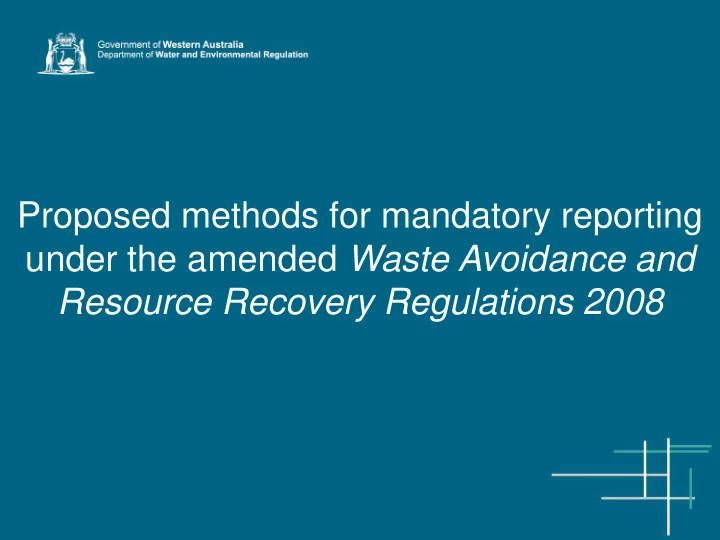

Proposed methods for mandatory reporting under the amended Waste Avoidance and Resource Recovery Regulations 2008
Legislative context • The Waste Avoidance and Resource Recovery Act 2007 (WARR Act) is WA’s primary waste management legislation . • Objects of the WARR Act are to contribute to sustainability, and the protection of human health and the environment in WA, and the move towards a waste-free society by: – promoting the most efficient use of resources, including resource recovery and waste avoidance; and – reducing environmental harm, including pollution through waste; and – the consideration of resource management options against the following hierarchy: • avoidance of unnecessary resource consumption; • resource recovery (including reuse, reprocessing, recycling and energy recovery); • disposal. • The WARR Act provides power for regulations to be made, including for the keeping, inspection and production of reports, records, return, registers and other information.
Waste strategy • The WARR Act provides for the development of a waste strategy. • The Waste Avoidance and Resource Recovery Strategy 2030 includes objectives to: – avoid waste; – recover more value and resources from waste; and – protect the environment. • Data provided by liable entities will be used to monitor and assess progress towards the waste strategy’s targets, which include 20% reduction in waste generation by 2030 and increase material recovery to 75% by 2030. • Data improvement to address accuracy issues is a focus of the waste strategy . Relevant strategies include: – Review and update data collection and reporting systems to allow waste generation, recovery and disposal performance to be assessed in a timely manner. – Provide support to local governments, recyclers and landfill operators for reporting under amendments to the WARR Regulations.
Supporting documents • Waste Avoidance and Resource Recovery Strategy 2030 Action Plan – Action 7.2 Mandatory reporting of waste and recycling data: – Implement new reporting requirements under amendments to the WARR Regulations and develop reporting guidance to provide support to local governments, recyclers and landfill operators. • Related to several key commitments in the Draft Waste Data Strategy (to be released soon) which is guided by the following waste data principles: – Relevant; – Quality; – Transparent; – Timely; – Efficient; and – Open by default, protected where required.
Current data regime • DWER collects data on metropolitan waste disposed to landfill through waste levy administration. • Data are also provided voluntarily through: – the annual Local Government Waste and Recycling Census; and – the Recycling Activity Review in Western Australia. • The objectives of collecting this data include: – Supporting the development of policy and programs; – Monitoring progress against the waste strategy; – Assessment of performance against State Budget KPIs; and – Reporting requirements to NEPC under the NEPM-UPM.
Rationale for amendments • Amendments to the Waste Avoidance and Resource Recovery Regulations 2008 (WARR Regulations) are being progressed to require annual reporting of waste and recycling data by local governments, recyclers and large regional landfills. • Quality data is the foundation of waste management in WA. • Voluntary reporting presents data quality issues such as incomplete datasets, variable response rates and inaccurate data. • Mandatory reporting will improve accuracy and completeness of data; and promote well-informed and targeted waste management policy and programs. • Aligns WA with reporting requirements in other jurisdictions (NSW and Queensland).
Proposed amendments – liable entities • Local governments • Recycling premises – – if reportable waste is treated, processed or sorted at the premises for the purposes of reprocessing, recycling or energy recovery; and – if as a result, at least 1,000 tonnes of reprocessed, recycled or recovered material is produced in a financial year at the premises that – • needs no further processing and is ready for use as a production input or final product; or • is to be exported from the State. • Large non-metropolitan landfills that receive at least 20,000 tonnes of reportable waste in a financial year. • Local governments and recyclers already report this information through the Census and RAR.
Proposed amendments • The proposed amendments were consulted on in late 2016 and will be gazetted by 1 July 2019. • Reporting will be required for the 2019-20 financial year. • The first mandatory reports will be due to DWER on or before 1 October 2020. • A CEO Notice will be issued by 1 July that clarifies your reporting requirements. • The proposed methods aim to provide guidance on how to measure, calculate and estimate quantities of waste. • An online reporting system will replace the spreadsheets currently used for the Census and RAR and facilitate more efficient reporting. • This will be in place in time for the submission of the first reports next year. More information on the development of the online reporting system will be made available at a later date.
Key questions • Are the proposed reporting obligations under the amended WARR Regulations clear and understandable? If not, what further clarification is required? • Are the proposed methods underpinning the amended WARR Regulations clear, understandable and fit for purpose? What, if any, clarification/further information is required? • Are there any barriers to collecting and reporting the data required under the WARR Regulations? Can DWER assist with overcoming these barriers? If so, what assistance could be provided?
Further consultation • The consultation papers on each approved method are available on DWER’s website. • You can provide written feedback via DWER’s website. • Feedback must be submitted by 5pm on Monday, 27 May . • Webinars have also been organised and details are available on the website. • Webinars will be recorded and made available on DWER’s for those who cannot view the webinars live.
Next steps • DWER will collate and analyse feedback provided. • Methods may be revised or clarified following consultation and will then be approved by the CEO (Director General of DWER). • The WARR Regulations, approved methods and CEO Notice will be gazetted by 1 July 2019 .
Recommend
More recommend